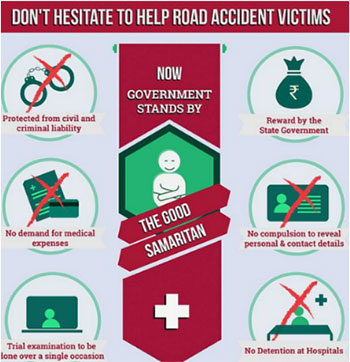NEW! The Gist (FREE) | E-BOOKS |
Good Samaritan Scheme: Important Topics for UPSC Exams
Good Samaritan Scheme: Important Topics for UPSC Exams
 Who
is a Good Samaritan?
Who
is a Good Samaritan?
- Good Samaritan or helpful bystander is a person who offers help to the accident victim without the anxiety of any criminal or civil liability.
Why is there a need for Good Samaritan law/scheme?
- As per the 201st report of the Law Commission of India, “Over 50 percent of those who die in road accidents can be saved with timely medical care within the first one hour."
- 50% of the road accidents can be avoided if rapid assistance is provided.
- 1.42 lakh people died in the road accidents in 2014.
- As per save life foundation data, 3 out of 4 people in India are hesitant to help accident victim due to fear of legal authorities and counter questions.
- To enable bystanders to come forward and help injured persons, a supportive legal and ethical environment is needed. In the absence of an efficient emergency medical services (EMS) system in India, bystanders can play a crucial role in ensuring that a road accident victim gets immediate help within the ‘golden hour’ period.
Various Judicial and Governmental actions
- In 2014, A Private member bill upon the Good Samaritan was introduced in the Parliament.
- March 2016, Savelife Foundation vs. Union of India, the Supreme Court (SC) incorporated the guidelines for the protection of Good Samaritans and Standard Operating Procedures for their examination by police and during the trial.
- Invocation of the article 141 and the article 142 of the constitution of India by the SC made above guidelines a “force of law”.
- November 2016, Karnataka Government introduced the “Karnataka Good Samaritan and Medical Professional (Protection and Regulation during Emergency Situations) Bill” in the Legislative Assembly making it the first state in India to move towards enacting a Good Samaritan Law.
- January 2017, Delhi Government unveiled ‘Good Samaritan Policy’ under which monetary incentive of Rs 2,000 and appreciation certificate will be given to people who help road accident victims in the national capital.
Timeline of the Legal Development
- 2012: PIL filed by SaveLIFE Foundation.
- October 2014: The Supreme Court directed the Centre to issue the necessary guidelines with regard to the protection of Good Samaritans until appropriate legislation was not made by the Union Legislature.
- May 2015: Ministry of Road Transport and Highways (MoRTH) notified the said guidelines. As per the guidelines, the disclosure of personal information by a Good Samaritan who brings an injured person to the hospital was made voluntary. They also provided that a Good Samaritan would not be liable for any civil or criminal liability.
- January 2016: MoRTH issued Standard Operating Procedures (SOPs) for the examination of Good Samaritans by the police or during the trial.
- March 2016: The Supreme Court reserved the judgment making the guidelines and SOPs binding on all states and union territories of India.
- March 2016: The Supreme Court approved the guidelines issued by the Centre.
- April 2016, Centre issued notification for the protection of Good Samaritans. Guidelines include:
- Assuring Good Samaritans anonymity and protecting them from any civil or criminal liability for taking the victim to the nearest hospital.
- They shall be treated respectfully and without discrimination on the grounds of gender, religion, nationality, caste or any other.
- Complete anonymity in case the Good Samaritan does not want to reveal his name or details.
- Use of video-conferencing in the case of any further interaction with him by the authorities and provision for the police to examine him at his residence or office or any place of his convenience.
Conclusion
Road safety is a major concern especially in developing countries and solution lies by not only enforcing the legal codes but also promoting ethical and moral codes on the constitutional lines. As the preamble of the Constitution promises about fraternity and brotherhood on similar lines Good Samaritan idea must be propagated by all possible means by treating fellow victims as not only another human being but as brothers and sisters.

